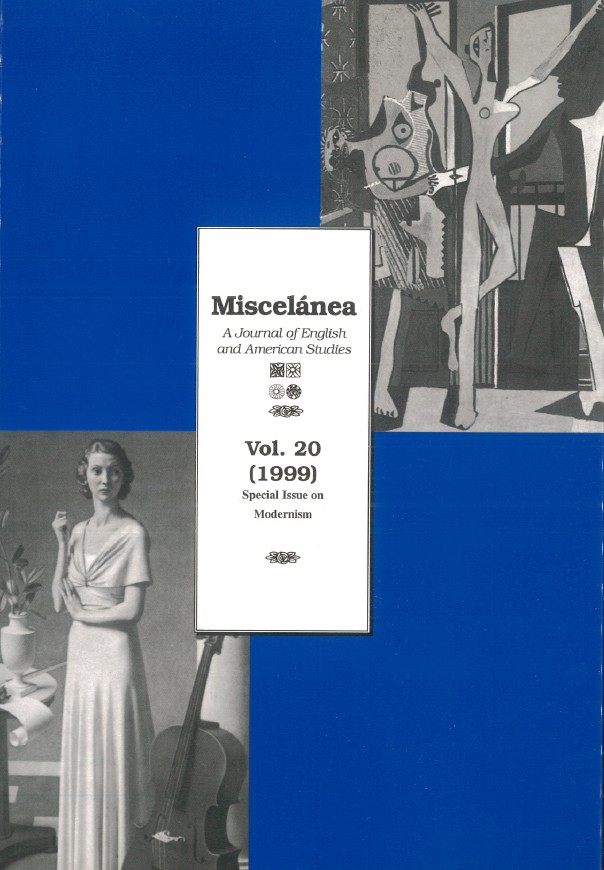Hemingway and Malraux: The Unmanned Virile Fraternity
DOI:
https://doi.org/10.26754/ojs_misc/mj.199911249Resumen
Este ensayo se basa inicialmente en la crítica feminista de Gilbert y Gubar,Ppykett, Bonnie Kime Scott y Elaine Showalter para subrayar el tema de la inadecuación masculina en la obra temprana de Hemingway y Malraux, dos de los novelistas modernistas más «masculinos». Tras la Primera Guerra Mundial, un determinado concepto de masculinidad se vuelve irrelevante y el héroe viril de ficción se ve envuelto en límites de género cambiantes. Harris discrepa, sin embargo, de las mismas teóricas feministas cuando sostienen que este proceso tuvo como resultado el empoderamiento de la mujer. El análisis textual y temático minucioso de una serie de obras demuestra que, si bien la dislocación causada por la guerra puede haber desprovisto de hombres al héroe viril, no conduce a la habilitación de la figura de la heroína. Si los personajes femeninos ocupan el vacío dejado por la asediada fraternidad viril, también heredan la nueva vulnerabilidad del hombre. La focalización en el héroe umano no contribuye a ningún concepto de la Nueva Mujer y la desaparición del héroe masculino no es t consecuencia de la aparición de una heroína autoritaria. La fraternidad viril es la única responsable de su propia dislocación.
Descargas
Referencias
ARAGON, L. 1928. Traite du style. Paris: Gallimard.
BARBUSSE, Henri. 1916. Le Feu. Paris: Flammarion.
BEEGEL, Susan F. 1996. "The Critical Reputation of Ernest Hemingway". In Donaldson, S. (ed.): 269-299. DOI: https://doi.org/10.1017/CCOL0521454794.013
BENSON, Jackson J. 1975. (ed.) The Short Stories of Ernest Hemingway: Critical Essays. Durham, North Carolina: Duke U. P
---. 1975. "Ernest Hemingway as Short Story Writer". In Benson, J. J. (ed.): 272-310.
BOURKE, Joanna. 1996. Dismembering the Male: Men's Bodies, Britain and the Great War. London: Reaktion Books.
CONRAD, Joseph. (1902) 1989. Hean of Darkness. Harmondsworth: Penguin Books.
DAo, Vinh. 1991. André Malraux ou la quête de la fraternité. Geneva: Droz.
DOVALDSON, Scott, (ed.). 1996. The Cambridge Guide to Hemingway. Cambridge: Cambridge U. P. DOI: https://doi.org/10.1017/CCOL0521454794
FUSSEL, Paul, 1975. The Great War and Moder Memory. London: Oxford U. P.
GILBERT, Sandra M. and Susan GUBAR. 1988. No Man's Land: The Place of the Woman Writer in the Twentieth Century. Vol. I. New Haven: Yale U. P.
HARRIS, Geoffrey T. 1996a. "Malraux and the Psychology of the Artist". French Cultural Studies 7 (February): 77-94. DOI: https://doi.org/10.1177/095715589600701905
---. 1996b. André Mairaux: A Reassessment. London: Macmillan.
HEMINGWAY, Ernest. (1929) 1963. A Farewell to Arms. Harmondsworth: Penguin Books.
---. (1927) 1970. The Sun Also Rises. London: Pan Books.
---. 1974. The Snows of Kilimanjaro and Other Stories. Harmondsworth: Penguin Books.
---. (1925) 1974a. "A Very Short Story". In Hemingway, E.
---. (1925) 19746. "The Battler". In Hemingway, E.
---. (1925) 1974c. "Big Two-Hearted River". In Hémingway, E.
---. (1927) 1965. "In Another Country". In Men Without Women. Harmondsworth: Penguin Books.
HovEY, R. B. 1975. "Hemingway's "Now I Lay Me": A Psychological Interpretation". In Benson, J. J. (ed.): 172-188.
JAUSS, Hans-Robert. 1987. "Expérience historique et fiction". In Gadoffre, G. (ed.). Certitudes et incertitudes de l'histoire. Paris: Presses Universitaires de France: 115-123. DOI: https://doi.org/10.3917/puf.gadof.1987.01.0117
KEIGER, J.F. V. 1997. Raymond Poincaré. Cambridge: Cambridge U. P. DOI: https://doi.org/10.1017/CBO9780511581984
LARRAT, Jean-Claude. 1996. Malraux: théoricien de la littérature 1920-1951. Paris: Presses Universitaires de France.
LEWIS, Robert W. 1992. "Hemingway, Malraux, and the Warrior-Writer". In Michalczyk, J. J. and S. Villani (eds.). Malraux, Hemingway and Embattled Spain. Special issue of North Dakota Quarterly 60 (2): 58-71.
MAGNY, Claude-Edmonde. (1948) 1995. "Malraux le fascinateur". In Larrat, J. C (ed.). La Condition humaine, roman de l'anti-destin. Orleans: Paradigme: 31.
MALRAUX, André. 1935. Preface. Andrée Viollis. Indochine S.O.S. Paris Gallimard: V-XVI.
---. 1946. Esquisse d'une psychologie du cinéma. Paris: Gallimard
---. 1989. Oeuvres Complètes. Vol. I. Paris: Gallimard, "Pléiade"
---. (1926) 1989a. La Tentation de l'Occident. In Malraux, A.
---. (1928) 1989b. Les Conquérants. In Malraux, A.
---. (1930).1989c. La Voie royale. In Malraux, A MARTIN, Wendy, 1987. "Brett Ashley as New Woman in The Sun Also Rises". In Wagner-Martin, L. (ed.): 63-82.
MAURIAC, Claude. 1946. "Pour qui sonne le glas, par Ernest Hemingway. La iver 15 (February): 133-134.
MCMILLAN, James F. 1981. Housewife or Harlot: The Place of Women in French Society 7870-1940. Brighton: Harvester Press.
PICON, Gaëton. 1953. Malraux par lui-même. Paris: Le Seuil.
POUND, Ezra. 1927. "The Editorial". The Exile 1 (Spring): 88-90
Руктт, Lyn. 1995. Engendering Fictions: The English Novel in the Early Twentieth Century. London: Edward Arnold.
RADULESCU, Dominica. 1994. André Malraux. The "Farfelu" as Expression of the Feminine and the Erotic. New York: Peter Lang.
REYNOLDS, Michael S. 1987. "The Sun in its Time: Recovering the Historical Context". In Wagner-Martin, L. (ed.): 43-64 DOI: https://doi.org/10.1017/CBO9780511624551.004
REYNOLDS, Siân. 1996. France Between the Wars: Gender and Politics. London: Routledge.
SANDERSON, Rena. 1996. "Hemingway and Gender History". In Donaldson, S. (ed.): 170-196. DOI: https://doi.org/10.1017/CCOL0521454794.009
SCOTT, Bonnie Kime. 1995. Refiguring Modernism, Vol. I, The Women of 1928. Bloomington: Indiana U. P.
SHOWALTER, Elaine. 1987. The Female Malady: Women, Madness and English Culture 1830-1980. London: Virago.
SMITH, Stan. 1994. The Origins of Modernism. Eliot, Pound, Yeats and the Rhetorics of Renewal. Hemel Hempstead: Harvester Wheatsheaf.
STEVENSON, Randall. 1992. Modernist Fiction: An Introduction. Hemel Hempstead: Harvester Wheatsheaf.
STRYCHAZ, Thomas. 1996. "In Our Time, Out of Season". In Donaldson, S. (ed.): 55-86. DOI: https://doi.org/10.1017/CCOL0521454794.004
TATE, Trudi. 1998. Modernism, History and the First World War. Manchester: Manchester U. P.
VALERY, Paul. 1919. "La Crise de l'esprit". La Nouvelle Revue Française 13 (August): 321-337.
WAGNER-MARTIN, Linda. (ed.). 1987. New Essays on The Sun Also Rises. Cambridge: Cambridge U. P. DOI: https://doi.org/10.1017/CBO9780511624551
WOOLF, Virginia. (1925) 1964. Mrs Dalloway. Harmondsworth: Penguin Books.
---. (1927) 1966. To the Lighthouse. Harmondsworth: Penguin Books.
Descargas
Publicado
Número
Sección
Licencia

Esta obra está bajo una licencia internacional Creative Commons Atribución-NoComercial 4.0.


